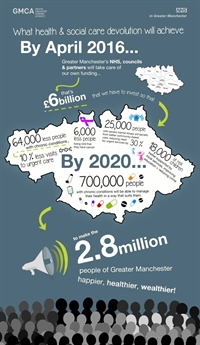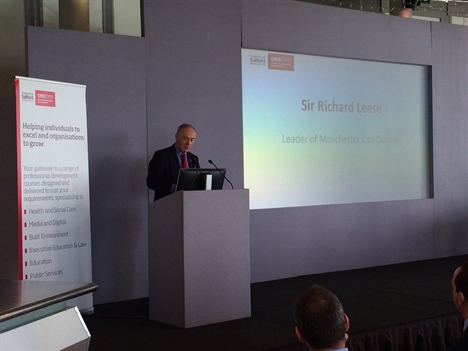01.12.15
Devo Manc: Making it stick
Source: NHE Nov/Dec 15
Katy Calvin-Thomas is helping lead the ‘Devo Manc’ health and social care transformation, on secondment from her executive director post at Pennine Care NHS FT.
The speed of change in Greater Manchester’s health economy brought about by the devolution agenda is startling – an initial announcement in February 2015, a plan by December and real change by April 2016.
Katy Calvin-Thomas, speaking at a conference on the ‘Northern Powerhouse’ organised by the University of Salford, attended by NHE, said: “I don’t think there’s anything massively radical about the ideas in the plan – the radical thing is that we’re doing it at scale, across 10 areas, with 37 organisation, at a pace that I’ve certainly never worked at during my career to-date.”
Calvin-Thomas, on secondment to the devolution team under chief officer Ian Williamson (the originally billed speaker at the conference, for whom she stepped in), began her talk by highlighting the stark health inequalities in Greater Manchester, and the fact that women in the conurbation die on average 10 years earlier than they do in other parts of the country.
She said: “This current system, no matter how hard we are trying, isn’t working – and it is continuing to consume vast amounts of resource that we know isn’t going to be there in the future.”
She spoke of the wider detrimental impacts that poor health can have, from difficulties with employment and education to mental health problems.
‘Absolute nightmare’
Calvin-Thomas was forthright when talking about the scale of the challenge. She said: “The devolution deal around health and social care happened very quickly for Greater Manchester and I think we are still the only city that has health and social care as part of its devolution deal.
“There’s probably a very good reason for that – which is that it is an absolute nightmare," she joked. "It is a very, very difficult piece [of work] to do. It’s absolutely the right thing to be doing, but it’s massively challenging.”
She said the fact that the initiative managed to sign up all the local authorities, CCGs and provider organisations so swiftly was a great sign, but now have to build on that work, which will “become ever more critical as we go forward into the real world next year”.
She explained: “Our ambition is to take control of an estimated budget of about £6bn being spent on health and social care. And the strategic plan we’re in the process of writing at the moment is really built on the submission we made as part of the broader devolution and Spending Review submission in September to the Treasury.”
Calvin-Thomas spoke of the “elusive” goal of taking activity and spending out of the acute sector and getting it closer to people’s homes, improving prevention as well as primary and community care.
Accountability
Governance is “absolutely critical” she said,
and that was her key piece of advice for any other areas considering a similar step. “It’s the bit that’s the hardest to agree, but it’s the bit that – when you start to talk to Treasury, or the NHS people, Monitor, the Trust Development Authority, or the Department of Health – it’s the bit they’re interested in. How do we make it stick, and how do we hold people to account? That might be our bread-and-butter in terms of our day jobs, but when we’re trying to bind statutorily independent organisations together, the governance becomes critical.”
The key principle, she said, is that there should be no decisions made concerning health and social care in Greater Manchester “without Greater Manchester in the room”.
Representatives of the national bodies will sit on the independently-chaired strategic partnership board, because “they need to be on our group, not thinking about us somewhere else”, Calvin-Thomas explained. They will sit alongside representatives of Greater Manchester Combined Authority, the CCGs, and the providers.
Focus on ‘place’ not ‘organisation’ can feel threatening for the NHS
 Speaking to an audience made up mostly of businesses, campaign groups, public servants and consultants from across the region, Calvin-Thomas said: “It won’t be news to you, but something that is hard for us to think about in the NHS is the [fact that] the focus of this plan is about people and place, not organisation. The NHS, for many, many years, has focused on organisation.”
Speaking to an audience made up mostly of businesses, campaign groups, public servants and consultants from across the region, Calvin-Thomas said: “It won’t be news to you, but something that is hard for us to think about in the NHS is the [fact that] the focus of this plan is about people and place, not organisation. The NHS, for many, many years, has focused on organisation.”
She said the focus on people and place is “really threatening to the NHS” because the conventional wisdom for many years has been that the main provider trusts are the key, with their own governance models and wide ambitions. “We’re saying: you can still have that, but it has to be part of what we’re doing on people and place. We’re still working on that, but it’s critical to get that change and shift in emphasis, because it starts to allow you to open some doors to some conversations that we’ve not concluded before.”
The whole plan is consistent with the aims of the Five Year Forward View, she said, as well as other recent reports like the Dalton review (on provider models) and Carter review (on NHS efficiency).
The main aims
The first big block of the plan is a “radical upscaling of prevention, public health, social movement [and] behaviour change”, Calvin-Thomas said. That last point is an important one: moving activity and spend out of the acute sector will only work if citizens’ behaviour can be changed too.
The plan also includes plenty of work on the primary care and community sectors, hospitals themselves, and an evidence base for better, safer, more cost-effective services.
She said estates policy needed change, labelling it “bonkers” that the Department of Health takes the receipt when parts of the estate are sold in Greater Manchester. “We should be able to keep that within our system and do something better with it.”
Back-office standardisation is also on the agenda, to prevent duplication across the city-region, as well as IT interoperability, information governance, data-sharing and aligned incentives.
“The only problem I’ve got at the moment is that nationally they’re telling me that’s going to take two or three years to do, and I haven’t got two or three years to create an incentive system across Greater Manchester. But I’m sure we’ll have the brains within the conurbation to do some of that more quickly, or at least to think about it.”

Above: Manchester City Council leader Cllr Richard Leese also spoke at the event about devolution to the city-region
Tell us what you think – have your say below or email [email protected]